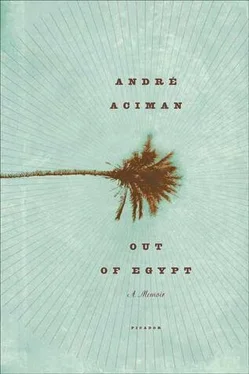When she had trouble remembering your name, she would search for it through an elaborate maze of other names in the family, thus betraying where you ranked in the hierarchy of her heart: first her son, Robert, then his three daughters, me, then her daughter who was deaf, her brothers, neighbors, her husband.
She cried once when I told her I had seen Uncle Robert in a dream. “And what did he say to you?” she fretted. More than a year had elapsed since his expulsion from Egypt after the 1956 war, and by then her life was entirely unsettled. “He said his daughter wanted to bring you a present,” I lied, thinking my dream would make her happy. But according to established Levantine custom, dreams always portend the opposite of what they say, which implied that her son in France was desperately in need of funds for his children.
Hence the frantic shopping for clothes, the scrupulous wrapping of parcels, the tireless standing in line at the post office, followed by epic worry sessions in the living room every evening as she, and anyone who happened to be visiting at that time, would sit and stew and fill themselves with as much gall as each could secrete, waiting for confirmation that the package had not fallen into the hands of the police or that some crafty postal clerk had not looted its contents. Wrapped in cobalt-blue paper, durable string, and stained with brittle reddish wax seals so old they bore her maiden name, her parcels were the product of a mind so naïve and so transparent that they might have fooled a master spy but not a child: a pair of homeknit overalls for each of her granddaughters, medicine that was hard to come by in France, a naughty assortment of rock candy carefully wrapped in colored cellophane paper, and, as though stitched by thoughtful celestial hands, a folded hundred-pound note sewn discreetly into the cuff of a child’s shirtsleeve. Her husband would find out sooner or later, and there were bound to be scenes. But her grandchildren come first she told the Princess, who, more than ever now, was convinced that this was truly a saint, though she noticed — as those who loved her sometimes did not — that her mind had already started to wander. “She is like a dove,” the Princess went on, “totally without bile.” “And without brains, either,” her husband had once replied.
A month later word arrived that the candies, overalls, magazines, and the petite surprise woven in by the hands of fate had arrived safely. “I knew it, I always knew it,” she exclaimed with great glee. “Then why did you worry so much?” asked the Princess, who had spent too many evenings soothing her neighbor’s worst fears to see them so readily dispelled now. “Because if I hadn’t worried, they might not have gotten there,” she replied, as though this were the most evident truth in the world. “I don’t understand,” added the Princess. “If you don’t understand, Madame Esther, then you don’t understand,” she would retort curtly, meaning she was certainly not about to divulge rituals that were so elaborate and so delicate that merely thinking about them, let alone discussing them with the uninitiated, might strip them of their spell.
“But please explain,” the Princess would insist, waiting to see what demented piece of logic might surface in her neighbor’s explanation. Like all mystics, however, the Saint refused to be baited.
“Madame Esther, I may not be learned,” she would say, “but I’m very sharp, très lucide. I sniff things out long before they happen.” Whenever she suspected someone was trying to make fun of her or pull the wool over her eyes, she would indicate her nose with an admonitory upraised index finger, as if her nostrils were a passageway to a venerable sixth sense. “And she thinks she’s sharp,” the Princess’s husband would scoff, sometimes even in the Saint’s presence. “She’s got the brains of a turnip, and the demented goathead goes around claiming she’s sharp — please!” Unruffled by the smirks around her, she would raise her inspired index finger, point to her nose a few times, smile her faint sagacious smile, and, whispering in my direction, say, “Let them. They think I don’t know, but I know.” She would look around sadly and sigh, reminded of yet sadder things in life.
“I’d give everything to see you grow into a young man. But that’s for an otra venida ,” she would smile, referring to another lifetime, the one to come , that storehouse of might-have-beens and second-time-arounds where all of life’s blemishes are polished over and edged in gold and filigree.
That was my cue, for on hearing her speak of la otra venida, I would lunge toward her and clasp her tightly, while she struggled with mock annoyed shoves, like a person about to be tickled or embraced in public, feigning to ask how dare I kiss her now after doing what I had done — which was to outlive her and deprive her of me someday. But then, seeing that I refused to release my hold, she would slacken and cease to fight and hug me back, staring into my face as if to make out whether I was indeed worthy of so much love, finally taking a deep, intoxicated breath, filled with longing and premonition and the yearning to inhale my entire being. All I had to do then was squeeze a bit harder, and out would come the sob she had been struggling to contain.
“You love me, I know, but you must love your other grandmother more,” she would say.
“Pathologically Sephardi,” observed Aunt Flora, who had witnessed the scene and had no patience for these emotional torsions that go by the name of love on the Mediterranean. “Nothing was ever more hostile,” she told me years later, “than this gnarled, twisted selflessness that chokes you like a bad debt and always makes you feel slightly unworthy and always unkind in the end.”
“But why won’t you let him say he loves you more, Madame Adèle?” Aunt Flora would protest half-jokingly on those hot summer afternoons when they drew the shutters to keep the sun out of the Saint’s living room while the two women played music for four hands. It was upon the Princess’s recommendation during the last days of the war that the Saint had hired Aunt Flora as a piano teacher. Now, a decade later, they had become like mother and daughter.
“Don’t you think I want him to love me more?” the Saint would ask.
“But why not let him, then?”
Irked, my grandmother would answer, “If you don’t understand, Flora, then I’m really sorry.”
On those summer afternoons, it would grow so quiet in the Saint’s apartment — and downstairs on Rue Memphis and all over Ibrahimieh — that, while my grandfather Jacques slept in his room, I too would often doze on the sofa, letting the chatter of the two women and of their piano exercises lull me into a long and restful nap. Sometimes, in mid-sleep, I was roused by the stirring of long spoons in tall lemonade glasses, or by the persistent whispers of the two women, or by a fly wandering about my face, it too woven into a dream along with the music of Liszt and the cooing of turtledoves who would come to rest on the windowsill where yesterday’s rice had been left for them by the Saint.
“At least I want him to love her the same,” my grandmother would insist, as though upholding a stubborn, principled egalitarianism in matters of love.
“But why ask anyone to love anyone the same? Besides, did wanting anything ever move the heart?” Flora would ask, adding, as she did so many years later in Venice, when we walked around Campo Morosini one summer afternoon, that “one seldom loves anyone at all, much less loves them well.”
“You don’t understand, Flora,” insisted the Saint, “I want him to love her so she won’t be jealous of me. I worry. What kind of grandmother do you think she’ll be for him once I’m gone?” “What do you mean, ‘gone’?” “Gone. As in gone away, Flora.” “What are you saying? You’re hardly sixty!” “I meant gone to France, Flora, not gone like that! Gone to England. To Constantinople. How do I know. Gone.” She paused a moment, probably realizing that the other meaning was not so farfetched either. “And besides, how many more do you think I’ve got left?” she asked, meaning years.
Читать дальше












